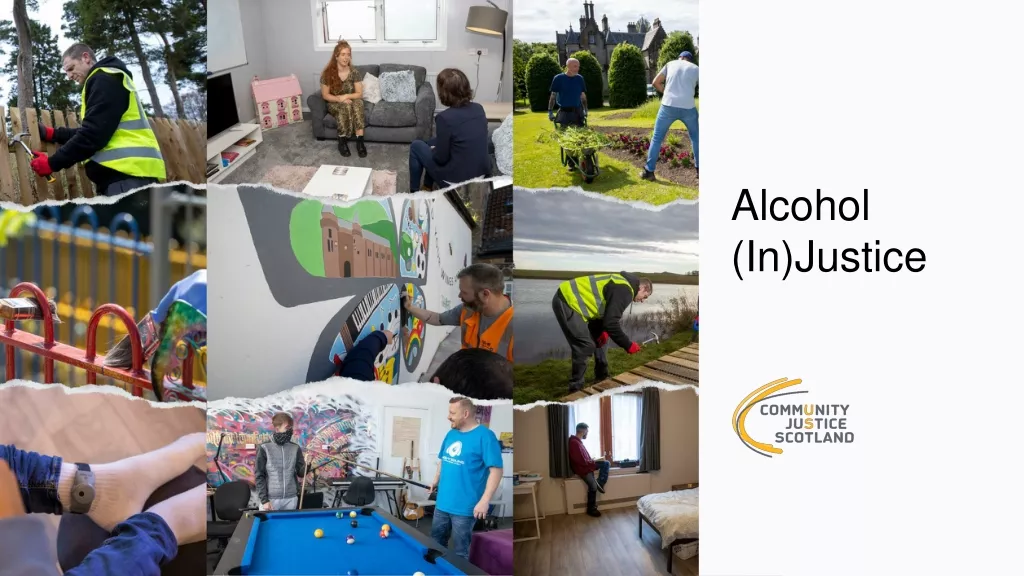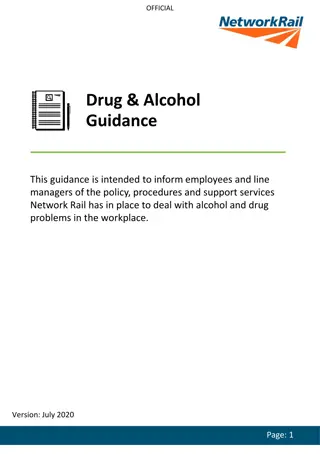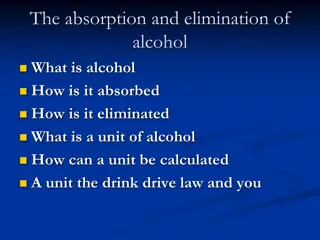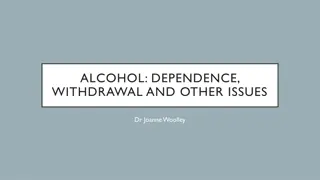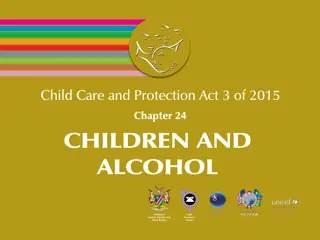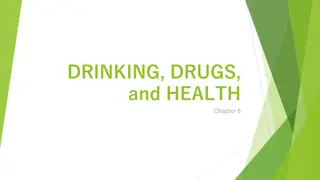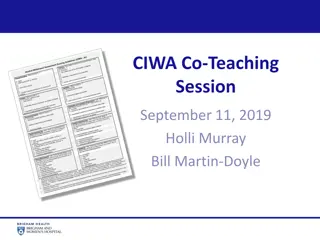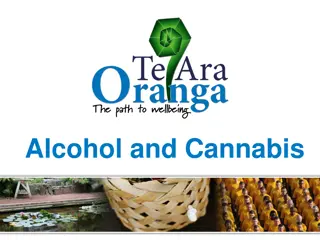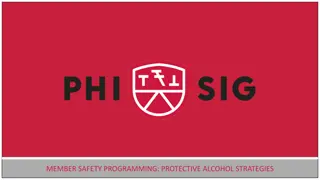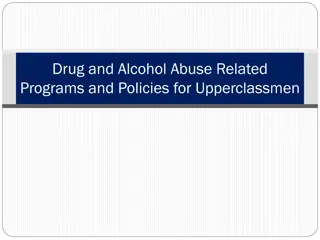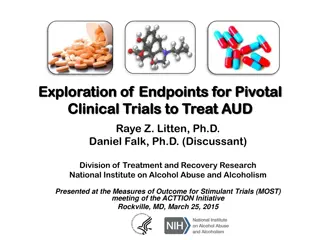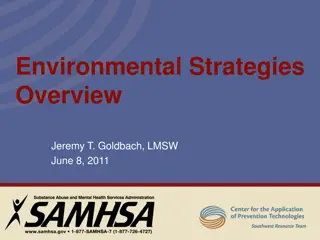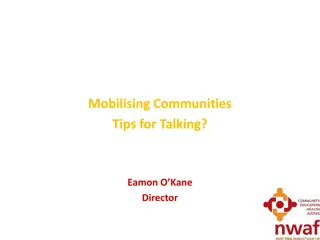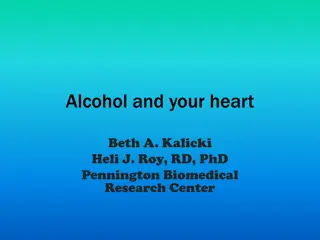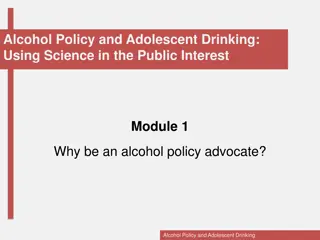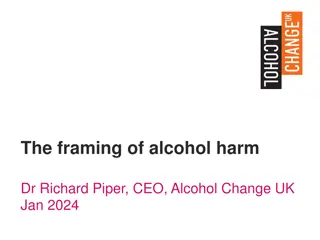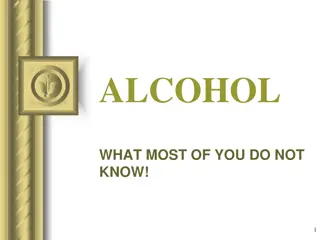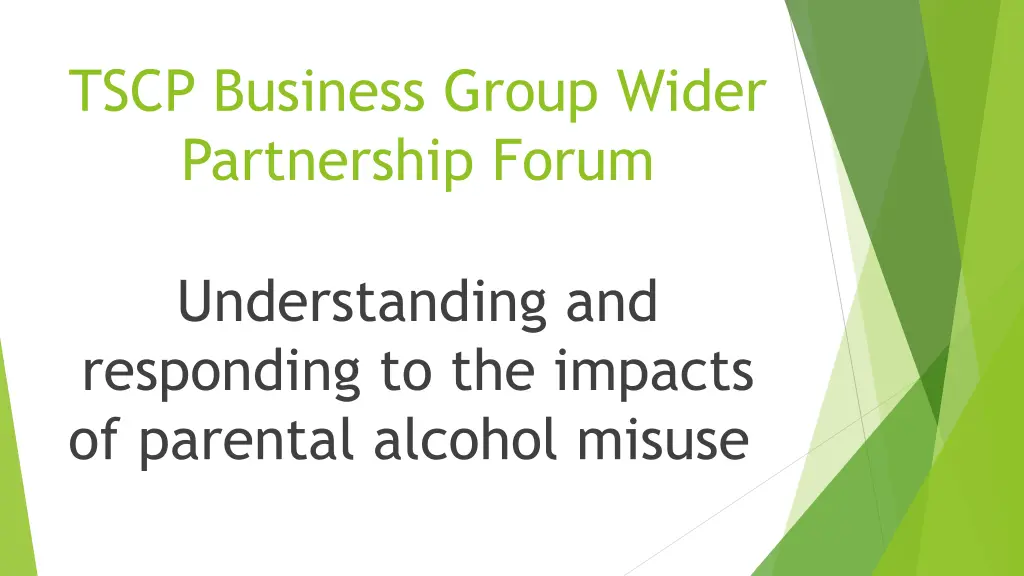
Understanding and Responding to Parental Alcohol Misuse Impacts
Explore the impacts of parental alcohol misuse on children's well-being and learn about identifying alcohol use disorders. Discover insights from Safeguarding Children Practice Reviews and the importance of intervention and support. Dive into the significance of trauma and adverse childhood experiences in shaping individuals' health outcomes.
Download Presentation

Please find below an Image/Link to download the presentation.
The content on the website is provided AS IS for your information and personal use only. It may not be sold, licensed, or shared on other websites without obtaining consent from the author. If you encounter any issues during the download, it is possible that the publisher has removed the file from their server.
You are allowed to download the files provided on this website for personal or commercial use, subject to the condition that they are used lawfully. All files are the property of their respective owners.
The content on the website is provided AS IS for your information and personal use only. It may not be sold, licensed, or shared on other websites without obtaining consent from the author.
E N D
Presentation Transcript
TSCP Business Group Wider Partnership Forum Understanding and responding to the impacts of parental alcohol misuse
Sally Clapp Recovery Coordinator IDVA Elizabeth Souster Volunteer for TRI Torbay Recovery Initiatives (TRI) Torbay Drug and Alcohol Services Torbay and South Devon NHS Foundation Trust
Why are we here? Report of the Safeguarding Children Practice Review regarding C92 & C93 (2022). Report of the Safeguarding Children Practice Review regarding C92 & C93 2022. Missed opportunities in respect of the Mum's alcohol use and the impact of that on her capacity to parent. Mum presenting as unpredictable, seeing her intoxicated and out of control. Level of parenting care, at times did not meet basic care needs for the children. Research shows that parental alcohol misuse can lead to parents having chaotic, unpredictable lifestyles and that they may struggle to recognise and meet their children s needs. This echoes the experiences of the boys. Lack of disclosure from children regarding Mum's drinking. Children's feelings and emotions towards Mum's drinking. Under reporting of alcohol use by Mum, increased tolerance levels and functioning. Self-reporting 20 units a week. Increased day drinking by Mum, reported drinking 7 bottles in 3 days, totaling 23 units per day. Driving whilst under the influence. "Self-confessed alcoholic" Opportunities to identify and intervene in 2012, 2013, 2016, 2017, 2018 and 2021.
Why do people drink? Tess Presentation Mentimeter Please complete your Audit questionnaires, before starting the Mentimeter.
Low, Medium, or High Risk Alcohol use disorders identification test (AUDIT) AUDIT is a comprehensive 10 question regarding alcohol harm screening tool. It was developed by the World Health Organisation (WHO) and modified for use in the UK and has been used in a variety of health and social care settings Scoring: 0 to 7 indicates low risk 8 to 15 indicates increasing risk 16 to 19 indicates higher risk, 20 or more indicates possible dependence Giving feedback and advice If the score is lower If the score is 8 or above, give brief advice to reduce risk for alcohol harm. If the score is 20 or above, consider referral to specialist alcohol harm assessment.
Trauma and Adverse Childhood Experiences - from children to adults Repeated activation of the body s stress-response systems (toxic stress) can cause hormonal imbalances, impair cognitive ability, and even change the way DNA is transcribed, causing ACEs to be passed down from one generation to the next. The length and frequency of exposure to toxic stress during childhood can in turn lead to health problems such as asthma, poor growth, frequent infections, learning difficulties and behavioural issues. Experiencing 4 or more ACEs is associated with significantly increased risk for 70% of the leading causes of death in adults including heart disease, stroke, cancer, respiratory disorder, Type 2 diabetes, Alzheimer s, and suicide. ACEs are not only associated with poorer health outcomes but a range of social and economic ones too. People with ACEs are more likely to under- perform in school, develop high-risk behaviours, and be on lower incomes. Deprivation, health, and social factors are closely related and perpetuate an inter-generational cycle of adversity. Gloucestershire's health and Wellbeing Board - ACEs - Adverse Childhood Experiences : Gloucestershire Healthy Living and Learning (ghll.org.uk)
Trauma and Adverse Childhood Experiences - from children to adults cont... 4 times likely to be a high-drinker 6 times likely to have had or caused unintended teenage pregnancy 6 times more likely to smoke and e-cigarettes or tobacco 6 times more likely to have had sex under the age of 16 11 times more likely to have smoke cannabis 14 times more likely to have been a victim of violence over the last 12 months 15 times more likely to have committed violence against another person in the last 12 months. 16 times more likely to have used crack cocaine or heroin 20 times more likely to have been incarcerated at any point in their lifetime.
Statistical data for Torbay Torbay has a population of 139.322 and approx. 22,748 are children. With deprivation in areas like income, employment, education, skills and training, health and disability, crime, housing and living environment. Education - increase in school children with EHCP's, this also being higher in England Children's social care is almost as twice as high as England, in Torbay. Although rates of children on CP have dropped but CIN remain significantly higher than England. Increased Domestic Abuse, where 29.3% of women and 14.1% of men have experienced domestic abuse at some time since the age of 16. (National Crime Survey Data). Statistics gathered from Torbay Joint Strategic Needs Assessment 2023/24.
Alcohol and Drug Statistics Team Name Team Name Count Drug Category Basic Drug Category Basic Count Torbay Recovery Initiatives 702 Alcohol 157 Alcohol and Non- opiate 81 Non-opiate 57 Opiate 407 Total 702
Data taken at Triage (1stAssessment) 150 Parents Child in Need Child Protection Early Help No CS Support Looked after child Declined to comment Alcohol 6 7 4 33 O 1 Alcohol- Non-opiate 3 4 0 15 2 0 Non-opiate 3 6 1 11 4 0 Opiate 4 5 1 36 4 0
What can you do? Talk to parents about their alcohol use, don t be afraid, the worse they will do is leave. Be honest and open. Try to find a common link i.e. it's tough being a parent and keeping up with everything (emails, text messages from school etc, that usually works) Remember they have been traumatised as well. Advise them Children Services will need to be informed, it s a duty of care. However, suggest our services, provide the contact details or better yet, if they are ready in that moment, let them make the call from the school. Supprt them to make that call, we will do the rest. If you're unsure, call us and discuss a hypothetical with either myself, Debi or our duty worker. Document what you have done in the MASH referral and your own notes. Discuss and reflect at supervision
Support for children Young carers referral from TRI Checkpoint - 01803 200100 CAMHS 5 Pillars of Resilience - Bounce Back Project or any other projects resources you have at school.
Torbay Recovery Initiatives (TRI) Torbay Recovery Initiatives offer support for adults over 18+ who have issues with Drugs (including prescribed, legal, illegal and over the counter medication) and or Alcohol support. Our service aims to be accessible to everyone and is dedicated to promoting wellbeing and recovery to all our clients, as well as signposting support to family and friends. We offer Psychosocial (1-1 sessions), Psychoeducational (workshops) and Prescribing Options. Individualised Recovery treatment plan - Recovery is a personal journey and as such everyone should be treated individually. We offer support fro community based residential rehabilitation programmes, Assessments for prescribing interventions, including community home detoxes and alcohol reduction plans. Blood borne virus testing (Hep B/C and HIV) and Hep B immunisations. Signposting and advise, Peer support and relapse prevention support. Naloxone and training on how to use it.
Contact Details Torbay Recovery Initiatives (TRI) Tel: 01803 291129 Website: Torbay Recovery Initiatives - Torbay and South Devon NHS Foundation Trust Referral Online: Drug and Alcohol Service referrals - Torbay and South Devon NHS Foundation Trust
Elizabeth Souster Road to Recovery

